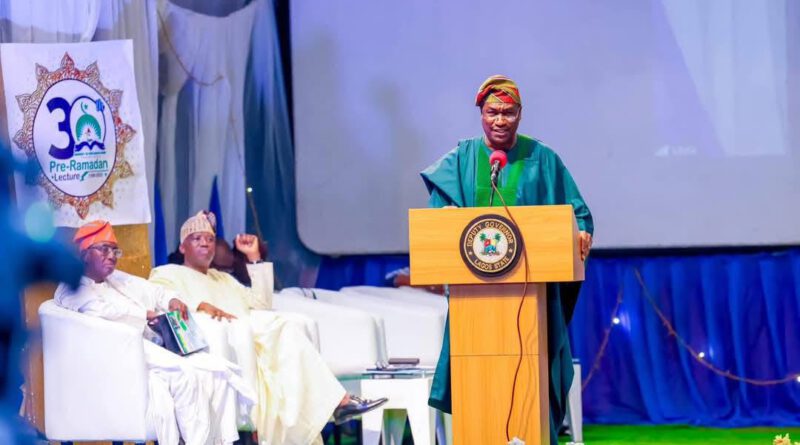Science, AI, and Society: Dr. Kadri Hamzat Advocates Ethical Consciousness at 30th UMA Pre-Ramadan Lecture
The Lagos State Deputy Governor, Dr. Kadri Hamzat, has expressed deep concern over the overwhelming influence and threats posed by science, particularly Artificial Intelligence (AI), on the future of humanity, especially the emerging younger generation.
Speaking as the keynote speaker at the 30th Pre-Ramadan Lecture organized by the University Muslim Alumni (UMA), with the theme “Transformative Power of Ramadan,” Dr. Hamzat emphasized the need for the Muslim community to be conscious and deliberate in shielding their children from being controlled by AI’s growing influence.
The event was held at the J.F. Ade Ajayi Auditorium, University of Lagos, Akoka.
He highlighted how rapidly science is changing the world, urging parents to be mindful of the challenges their children will face in this evolving landscape.
Dr. Hamzat also lamented the rising trend of men abandoning their family responsibilities, leaving women to bear the burden of raising children alone.
He cited research findings revealing that many women refer to themselves as widows despite their husbands being alive, reflecting the extent of this societal problem.
The Deputy Governor also referenced a recent executive order signed by former U.S. President Donald Trump, noting the disparity in how Nigerians are labeled as immigrants when they travel to the U.S., whereas Westerners who come to Nigeria are referred to as expatriates.
Commending the UMA for its dedication to intellectual discourse, Dr. Hamzat stressed that the impact of such gatherings resonates deeply, urging everyone to work collectively in transforming society.
He further noted that while Ramadan is meant to transform individuals, its impact should extend beyond the one-month fasting period.
The Chief Host of the event, Professor Folasade Ogunsola, Vice-Chancellor of the University of Lagos, lauded UMA for sustaining this unique tradition for the past 30 years.
Represented by Professor Bolanle Obo, the Deputy Vice-Chancellor (Academics & Research), she expressed gratitude for UMA’s scholarship support for postgraduate students, emphasizing that such initiatives greatly benefit the institution.
She also highlighted the harmonious relationships within the university community, stating that religious and ethnic differences have not hindered unity among stakeholders.
Prof. Ogunsola pointed out the uniqueness of this year’s Ramadan fast, as it coincides with the Christian Lent season.
She expressed hope that the transformative power of Ramadan would reflect positively on Nigeria, which is at a critical juncture requiring collective efforts toward national progress.
Delivering the first lecture, Professor Mashood Baderin of the School of Law, Gender & Media, University of London, UK, reminded attendees that Islam is a complete way of life for Muslims.
He urged the faithful to use their wealth in supporting those in need, emphasizing the importance of understanding and embodying the spiritual aspects of Islam in daily life.
Prof. Baderin underscored the five pillars of Islam as a guiding principle for practicing the religion righteously, noting that each pillar represents an essential aspect of faith.
He stressed that while Ramadan encourages good conduct, some people fail to derive its full benefits.
He described Ramadan as the minimum fast prescribed annually for Muslims, which must be observed with sincerity and devotion.
As the ninth month of the Islamic calendar, Ramadan is a period of fasting lasting between 29 to 30 days, as commanded by Allah.




